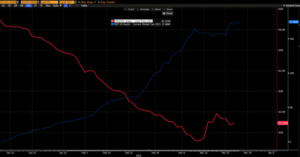By Kelvin Lee, Alonso Munoz
Bitcoin ETFs: Should I buy them?
Since its ETF approval on January 10th, Bitcoin exchange-traded funds have had roughly $25 billion in inflows. Bitcoin (BTC) itself is up 60% year-to-date and has more than tripled in value from a year ago. It’s not just BTC either; Ethereum (ETH) and a range of meme coins have made a resurgence over the past few months as well. The demand for digital assets seems unrelenting, and we’re already past the highs we saw in 2021. So now that anyone can buy BTC through their favorite broker, it’s important to look at why fueling this growth.
Gold V2
A compelling case for including Bitcoin in a portfolio is to treat it as a commodity, particularly as a better alternative to gold. Think about why people invest in gold in the first place. It’s a globally accepted reserve asset without ties to a single government and a crisis commodity for geopolitical risks. From an allocation perspective, gold adds diversification by hedging a portfolio from currency fluctuations. However, gold is heavy and inconvenient to store and transport. Physical bullion has the same liquidity issues as other commodities when needing to be converted into cash. Even paper gold assets have expenses related to their storage and redemption. Now consider Bitcoin. Given its popularity, it’s an accepted store-of-value asset, and since there is a finite amount of bitcoin available to be mined, it’s inflation indifferent. It’s decentralized, so there is no government interference. And lastly, it’s digitalized on the blockchain. There’s 24/7 price discovery, and it’s very easy to hold and trade. There’s no vault or armed security truck that holds BTC, but rather a digital wallet; the key to which is in your head or flash drive (hopefully). It’s quick too; transferring BTC to another wallet is instantaneous, trading American Eagles isn’t. The argument that BTC is the new gold is strong, and markets seem to agree. Below shows the total holding of Gold ETFs (in red) compared to iShares’ BTC ETF market cap (in blue). There’s a notable negative relationship which suggests investors are swapping their allocation from gold to BTC. The aggregate gold market is $15 trillion; a 10% swap would quadruple the inflows we’ve seen this year already.

Technology
When you buy Bitcoin, you’re buying into the revolutionary BLOCKCHAIN TECHNOLOGY, and that’s the future. Who wouldn’t want to be invested in the future? As we increasingly digitalize and decentralize networks to transition the internet on a distributed ledger (dubbed Web 3.0), the likely currency to facilitate this will be Bitcoin. It’s all based on reorganization via blockchain, so in that sense, yeah, I’d love to have some BTC. Cash? Pffft, that’s so 2018. In an age with decentralized autonomous organizations, digital deeds, and $69 Million NFT’s, you can see the need for a currency that keeps up on the same technology. The push for decentralized finance (DeFi) and growing AI adoption is just going to grow the progress toward Web 3.0. It’s not a question of if, but when.
Speculation
As with any investment, people are in it to make money. Whether anyone cares about the greatness of blockchain technology or its viability to replace gold, BTC is mainly being bought because it’s appreciated more than 1000% over the last 5 years. There’s no cash flow to discount or fundamentals to look at; BTC is worth $70,000 because everyone collectively agrees it is. And we don’t say this to slight the asset. Meme stocks, coins, and arguably even the magnificent 7 stocks trade where they are because of sentiment, which if you guess correctly, generates a lot of Alpha. Believe us, we’d love to have bought BTC 10 years ago in the nascent stages of digital tokens. Of course, in the pursuit of making money, there’s gambling. Now in ETF format, BTC gets the full spa treatment of day traders, Reddit WallStreetBets investors, and zero-day option fanatics. It’s hard to say how much of BTC’s daily volume is made up of this crowd, but demand for BTC is high enough that big sponsors have already stepped in to collect their fees on the trillion-dollar crypto markets. Just this week, ProShares launched a leveraged and short BTC fund with a pricey 133 bps in expenses.
Final Thoughts
Obviously, none of the above is investment advice, and we’re only explaining the growing interest in BTC from the perspective of professional asset managers. Adoption and price volatility are still the main drawbacks to BTC, and there isn’t a clear answer to how regulation will affect the crypto industry in the near future. In any case, the growing interest in BTC is undeniable, and the argument for cryptocurrencies is already being heard on Wall Street.
Here’s what BlackRock’s Larry Fink had to say earlier this year: “ETFs are step one in the technological revolution in the financial markets. Step two is going to be the tokenization of every financial asset.”
To contact the author of this story:
Kelvin Lee at kelvin@hamiltoncapllc.com
To contact the editor responsible for this story:
Alonso Munoz at alonso@hamiltoncapllc.com
This commentary reflects the personal opinions, viewpoints and analyses of the Hamilton Capital Partners, LLC, a registered investment advisor, employees providing such comments, and should not be regarded as a description of advisory services provided by Hamilton Capital Partners, LLC or performance returns of any Hamilton Capital Partners, LLC client. The views reflected in the commentary are subject to change at any time without notice. Nothing in this commentary constitutes investment advice, performance data or any recommendation that any particular security, portfolio of securities, transaction or investment strategy is suitable for any specific person. Any mention of a particular security and related performance data is not a recommendation to buy or sell that security. Hamilton Capital Partners, LLC manages its clients’ accounts using a variety of investment techniques and strategies, which are not necessarily discussed in the commentary. Investments in securities involve the risk of loss. Past performance is no guarantee of future results.






